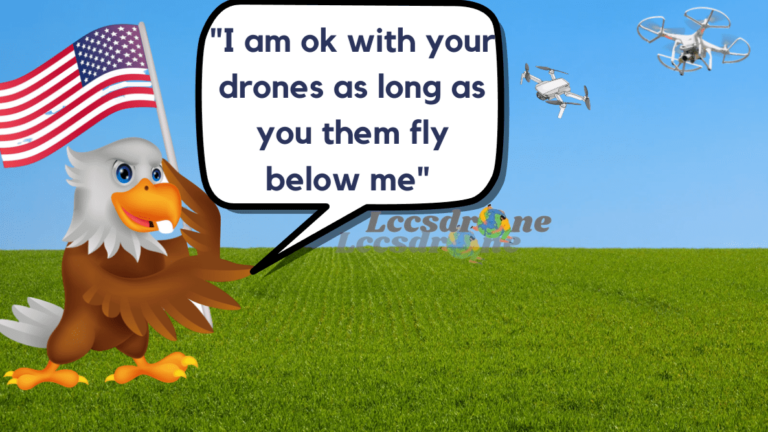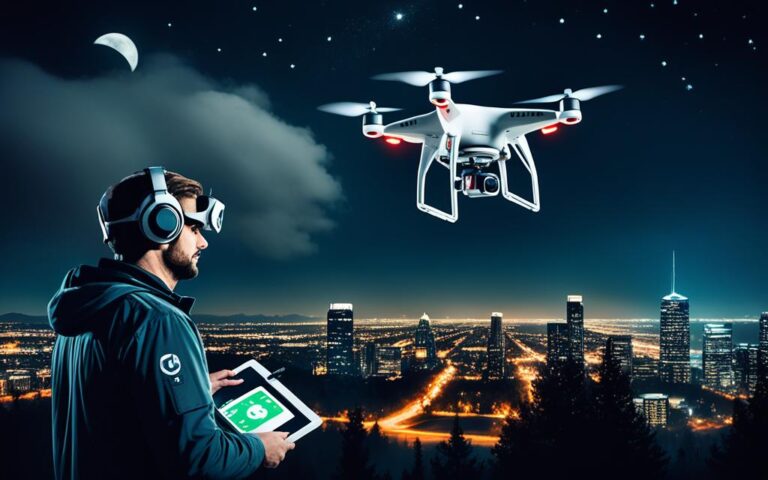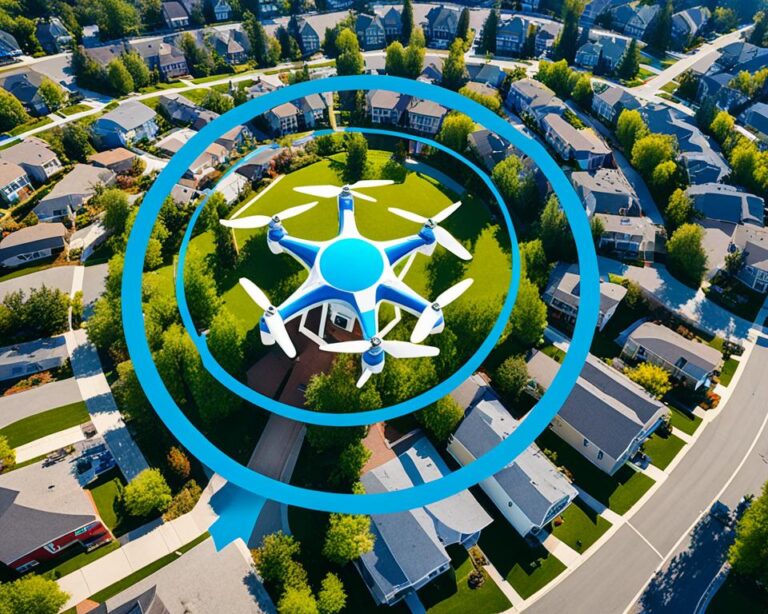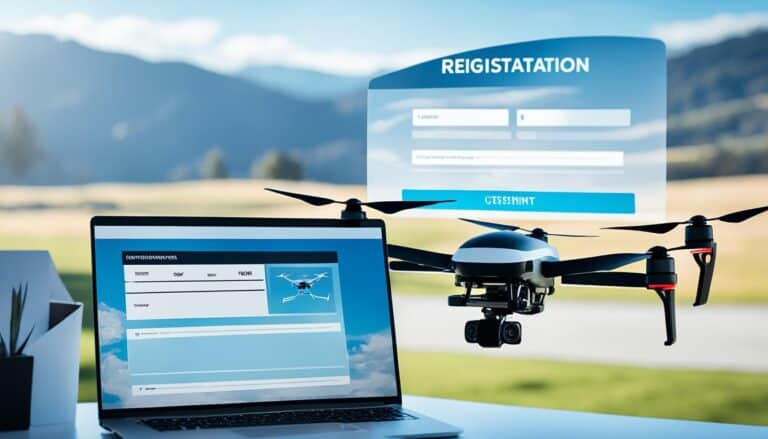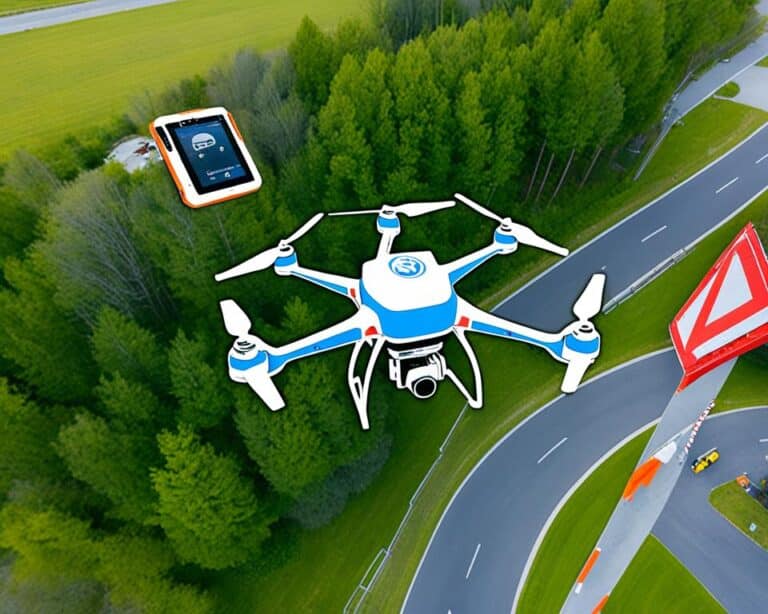Drone Laws Florida: Stay Legal in the Sky
Have you ever wondered if you are breaking any laws while flying your drone in Florida? Is it really necessary to register your drone? And what about flying near airports or stadiums? In this article, we will explore the drone laws in Florida and provide you with all the information you need to ensure a safe and legal flying experience.
Key Takeaways:
- Understanding and complying with drone laws in Florida is crucial for a safe and legal flying experience.
- All drone operators in Florida need to register their drones with the Federal Aviation Administration (FAA).
- There are specific restrictions on where you can fly your drone in Florida, including airspace regulations and no-fly zones.
- Safety guidelines, such as flying below 400 feet and maintaining visual line of sight, must be followed by all drone operators in Florida.
- Violating drone laws in Florida can result in severe penalties, including fines and potential criminal charges.
Do I Need to Register My Drone in Florida?
Before taking to the skies with your drone in Florida, it’s important to understand the registration requirements set forth by the Federal Aviation Administration (FAA). Whether you’re a recreational or commercial drone operator, registering your drone is a necessary step to ensure compliance with the law.
To register your drone in Florida, simply visit the FAA’s online registration portal. The registration process is quick and straightforward, requiring some basic information about yourself and your drone. Once your registration is complete, you will receive a unique identification number that must be visibly displayed on your drone.
Registering your drone not only helps to promote responsible drone use but also aids in the recovery of your drone in case it gets lost or stolen. Additionally, it allows authorities to identify and contact you as the owner in case of any incidents or accidents involving your drone.
The Importance of Drone Registration
Drones have become increasingly popular in recent years, and with that popularity comes a need for regulations to ensure safety and accountability. Registering your drone in Florida is a legal requirement that helps maintain order and protect the airspace.
Registering your drone in Florida is essential to fly legally and responsibly. By taking this step, you contribute to the safe integration of drones into the airspace and help prevent potential conflicts with other aircraft.
Moreover, drone registration provides a comprehensive database of drone owners, facilitating effective communication between the FAA and drone operators. This allows authorities to disseminate crucial information, such as airspace restrictions or safety updates, to registered drone owners to ensure they are well-informed and compliant.
The Penalty for Failure to Register
It’s important to note that failure to register your drone in Florida can result in severe penalties. Unregistered drone operators may face fines, civil penalties, or even legal repercussions. By registering your drone, you demonstrate your commitment to adherence to the law and responsible drone operation.
| Consequence | Penalty |
|---|---|
| Flying an unregistered drone | Up to $27,500 in civil penalties |
| Operating a registered drone without proper identification number displayed | Up to $27,500 in civil penalties |
| Intentional violation of drone laws | Potential criminal charges and higher fines |
It’s always better to err on the side of caution and ensure compliance with the law by registering your drone. This simple step provides peace of mind and allows you to enjoy the thrills of flying in Florida while avoiding unnecessary legal consequences.
Where Can I Fly My Drone in Florida?
When it comes to flying a drone in Florida, understanding where you can safely and legally operate is essential. Florida has specific airspace restrictions and designated no-fly zones that all drone operators must adhere to. By following these guidelines, you can ensure a responsible and enjoyable flying experience.
To stay informed about restricted areas and airspace regulations, it’s important to consult the Federal Aviation Administration (FAA)’s B4UFLY app or visit their website. These resources provide up-to-date information on areas where drone flights are prohibited or restricted, such as near airports or sensitive locations. By checking these sources regularly, you can plan your flights accordingly and avoid any potential violations.
Respecting the privacy of others is also crucial when flying a drone in Florida. Flying over private property without permission is not only a violation of privacy but can also lead to legal consequences. It’s important to be mindful of your surroundings and ensure that you are not intruding upon someone’s privacy while enjoying your drone flights.
“By understanding and adhering to the airspace restrictions and respecting the privacy of others, drone operators can enjoy their flights in compliance with Florida’s laws and regulations.”
Remember, the aim is to have a safe and responsible flying experience while complying with the regulations. By familiarizing yourself with the restricted areas, airspace regulations, and privacy laws, you can confidently enjoy flying your drone in Florida’s beautiful skies.
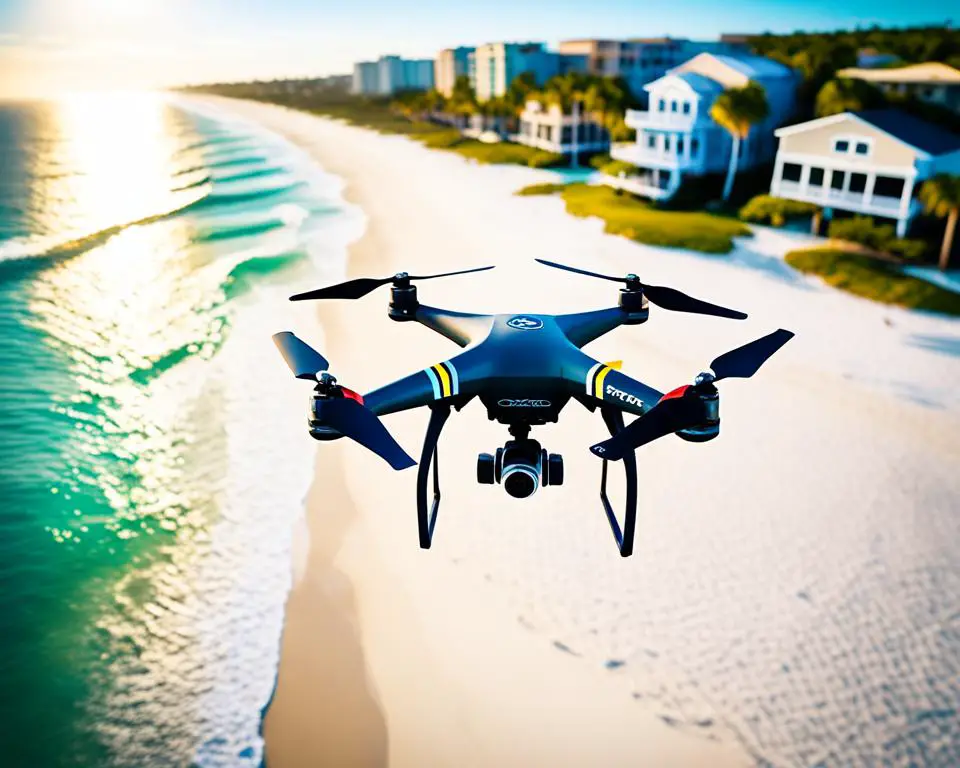
What Are the Safety Guidelines for Drone Operators in Florida?
To ensure safe drone operations in Florida, drone operators must follow the safety guidelines set by the Federal Aviation Administration (FAA). These guidelines are in place to protect both operators and the general public, and adherence to them is crucial for a secure and responsible flying experience.
Here are some of the safety guidelines that drone operators in Florida should keep in mind:
- Fly below 400 feet: Drone operators must maintain a maximum altitude of 400 feet above ground level. This helps prevent collisions with manned aircraft and ensures the safety of everyone in the airspace.
- Maintain visual line of sight: It is important to always keep the drone within the operator’s visual line of sight. This allows for better control and awareness of any potential obstacles or hazards.
- Avoid manned aircraft: Drone operators must yield right of way to all manned aircraft. It is essential to keep a safe distance from airports, helipads, and other areas where manned aircraft operate.
- Be aware of weather conditions: Before flying a drone, operators should check the weather forecast and avoid flying in high winds, rain, or other adverse weather conditions that may affect the stability and control of the drone.
- Fly responsibly: Drone operators should fly responsibly and avoid endangering people, property, or wildlife. This means avoiding flying over crowds, private property without permission, or restricted areas.
Following these safety guidelines not only ensures a safe and enjoyable flying experience but also helps promote responsible drone operations in Florida. By adhering to these guidelines, drone operators can minimize the risks associated with drone flights and contribute to the overall safety of the airspace.
If you want to learn more about drone safety guidelines, you can visit the FAA’s website or consult their official documentation.
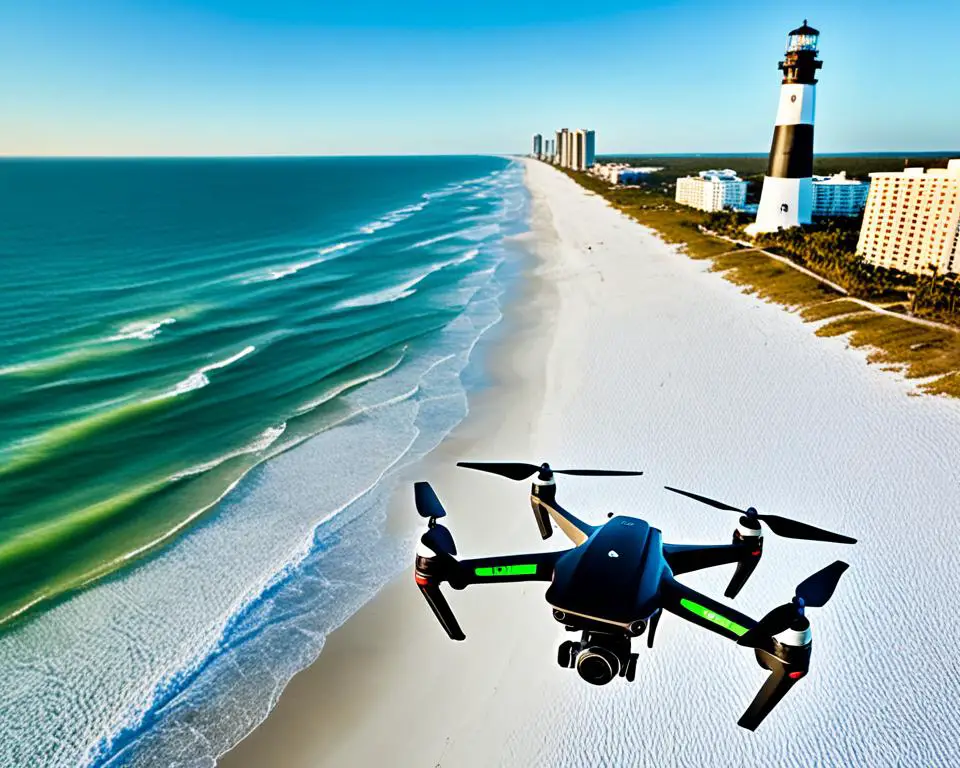
What Are the Restrictions for Flying Drones Near Airports and Stadiums in Florida?
Drone operators in Florida need to be aware of the restrictions and prohibitions surrounding the operation of drones near airports and stadiums. To ensure safety and comply with regulations, it is strictly prohibited to fly drones within five miles of an airport or in areas where temporary flight restrictions (TFRs) are in place. Additionally, according to FAA regulations, the operation of drones over stadiums during sporting events is prohibited.
These restrictions are in place to protect airspace safety and the privacy of individuals in sensitive areas. By adhering to these regulations, drone operators can ensure that their flights are within the legal boundaries and avoid endangering other aircraft or infringing upon the privacy of individuals.
Please note that flying drones near airports and stadiums in Florida is subject to strict regulations and could result in severe penalties for violations. It is crucial for drone operators to familiarize themselves with the specific restrictions in their area before operating their drones.
What Are the Privacy Laws for Drone Operators in Florida?
As a drone operator in Florida, it is important to be aware of the privacy laws that govern your activities. These laws are in place to protect the rights and privacy of individuals and must be adhered to at all times.
One key aspect of privacy laws for drone operators in Florida is the prohibition against using drones for surveillance purposes without consent. This means that you cannot use your drone to capture images or recordings of people without their permission, especially in certain situations where their reasonable expectation of privacy may be violated.
It is essential to respect the privacy of others and avoid any activities that may infringe upon their rights. This includes refraining from flying your drone in areas where people have a reasonable expectation of privacy, such as private property or inside someone’s home.
Additionally, it is crucial to understand that privacy laws can differ depending on the specific circumstances and locations. For example, certain public spaces may have restrictions on the use of drones for privacy reasons. Therefore, it is vital to familiarize yourself with the local regulations and any additional privacy laws that may apply in the areas where you intend to fly your drone.
By respecting the privacy laws for drone operators in Florida, you not only ensure compliance with the legal requirements but also contribute to maintaining a positive image of drone enthusiasts and professionals. Remember, responsible and ethical drone operations are key to fostering understanding and acceptance among the public.
“Respecting the privacy of individuals is not just a legal obligation but also a moral responsibility of every drone operator.”
Implications for Drone Operators
Understanding and complying with privacy laws is essential for drone operators in Florida. Failure to do so could result in legal consequences, including fines and potential damage to your reputation. To avoid such penalties, consider the following guidelines:
- Always obtain consent: Before capturing images or recordings of individuals, ensure that you have their explicit permission. This applies to situations where a reasonable expectation of privacy exists, such as private gatherings or secluded areas.
- Be aware of restricted areas: Some public spaces, such as schools, parks, or beaches, may have specific regulations regarding drone use to protect privacy. Familiarize yourself with these restrictions to avoid any unintentional violations.
- Respect private property: Flying your drone over someone’s private property without permission can be a breach of privacy. Always seek the owner’s consent before operating your drone in such areas.
- Stay informed: Keep up to date with any changes in privacy laws and regulations that may affect your drone operations. Regularly check for updates from local authorities and industry organizations.
Summary
Drone operators in Florida must understand and comply with the privacy laws that govern their activities. These laws prohibit the use of drones for surveillance without consent and require operators to respect the privacy of others. By following these laws and guidelines, drone operators can ensure both legal compliance and ethical conduct, contributing to a positive reputation for the drone community as a whole.
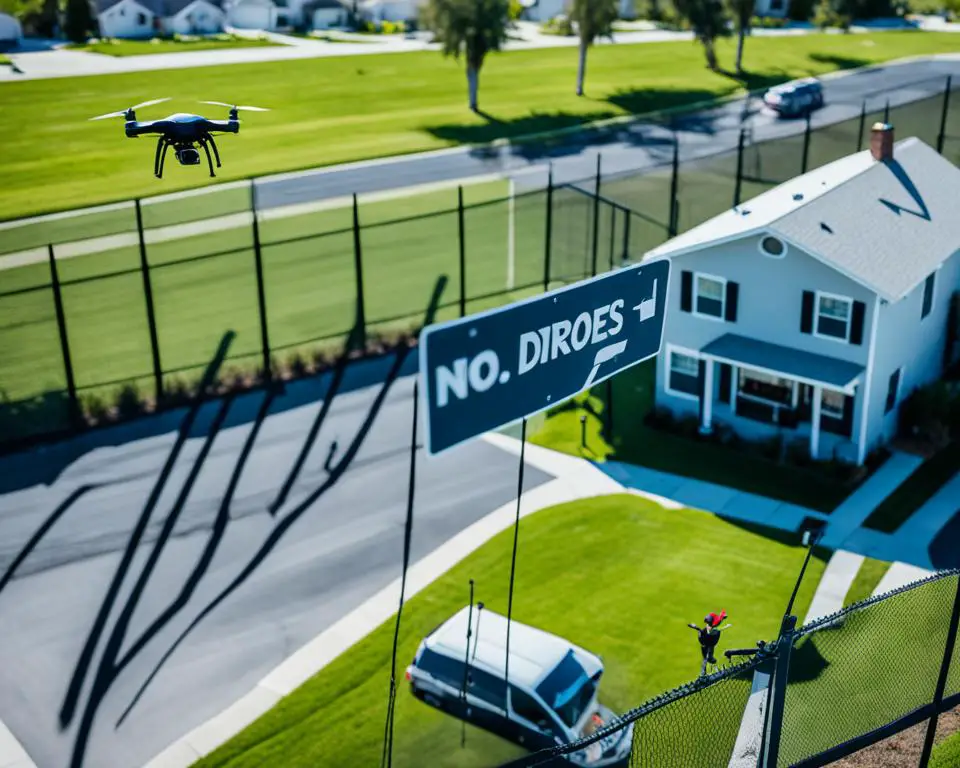
What Are the Penalties for Violating Drone Laws in Florida?
When it comes to drone laws in Florida, there are strict regulations in place to ensure the safety and privacy of individuals. Familiarizing yourself with these laws is crucial to avoid the penalties that can result from violating them.
The specific penalties for violating drone laws in Florida may vary depending on the nature and severity of the violation. However, common penalties include fines, confiscation of the drone, and potential criminal charges.
By disregarding the laws and regulations, you not only risk facing legal consequences but also compromising the safety of others. Florida has implemented these penalties to deter individuals from engaging in irresponsible drone operations.
It is important to note that fines vary based on the specific violation. For example, flying a drone in restricted airspace or over a stadium during a sporting event can result in higher penalties compared to other violations.
“Violating drone laws in Florida can have serious consequences, including fines and potential criminal charges. It’s important to understand and abide by these laws to ensure the safety and privacy of everyone involved.”
To give you a better idea of the penalties you could face for violating drone laws in Florida, refer to the table below:
| Violation | Possible Penalties |
|---|---|
| Flying in restricted airspace | Fines of up to $20,000 and potential criminal charges |
| Operating a drone without proper registration | Fines up to $5,000 and confiscation of the drone |
| Flying over private property without consent | Fines up to $1,000 per violation |
| Using a drone for surveillance without consent | Fines up to $10,000 and potential criminal charges |
These penalties are designed to ensure that drone operators in Florida adhere to the laws and regulations established for safe and responsible drone use.
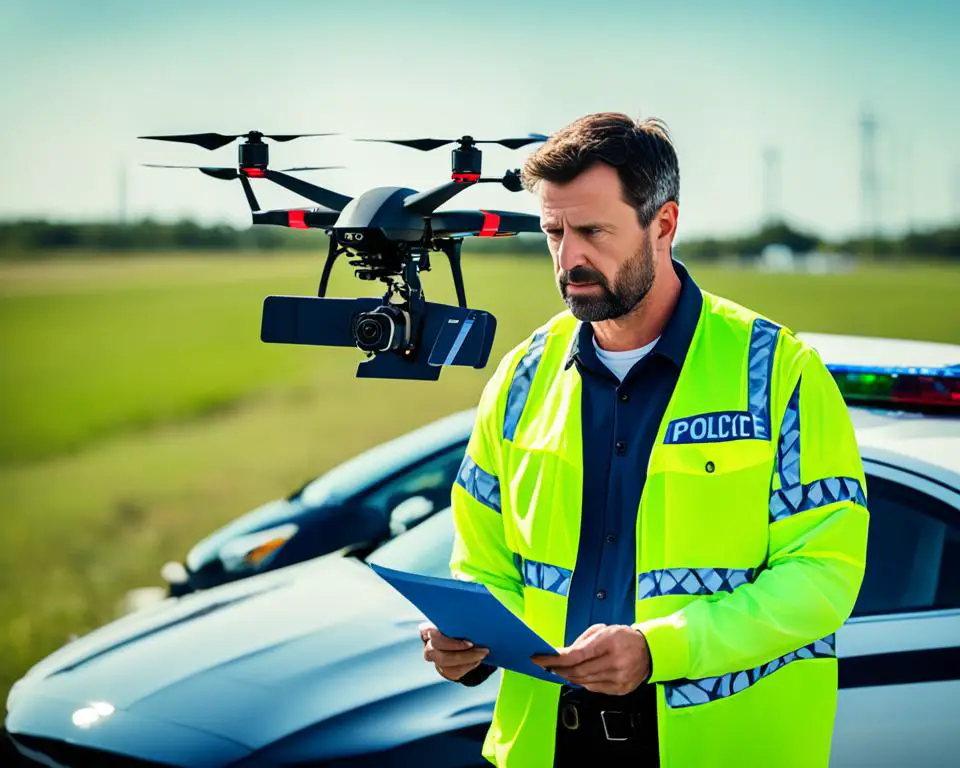
Staying Compliant with Florida Drone Laws
In order to avoid these penalties and ensure a positive drone flying experience in Florida, it’s essential to stay compliant with the drone laws and regulations. This means registering your drone with the FAA, respecting no-fly zones and airspace restrictions, and obtaining consent when flying over private property.
By following the proper protocols and using your drone responsibly, you can enjoy capturing breathtaking aerial footage while maintaining the safety and privacy of yourself and others.
Resources for Drone Operators in Florida
For drone operators in Florida, navigating the laws and regulations can sometimes be challenging. Fortunately, there are several valuable resources available to help you stay informed and ensure a safe and compliant operation. Whether you’re a recreational or commercial drone operator, these resources can provide you with the necessary guidance and support.
1. Federal Aviation Administration (FAA)
One of the primary resources for drone operators in Florida is the Federal Aviation Administration (FAA). The FAA’s website offers a wealth of information on drone registration, airspace restrictions, and safety guidelines. Here, you can access comprehensive guides and documents that will help you understand and comply with the regulations specific to Florida. Stay up to date with any changes or updates by regularly checking the FAA’s website.
2. Local Organizations and Communities
Aside from the FAA, there may be local organizations and communities in Florida that provide resources and guidelines to drone operators. These groups often offer valuable insights into local regulations, flying locations, and best practices. Consider reaching out to local drone clubs or joining online forums where you can connect with experienced operators and gain insights into specific regions within Florida.
3. Drone Operator Training Programs
If you’re new to drone operations or want to enhance your skills, various training programs are available in Florida. These programs cover topics such as flight safety, navigation, and responsible drone operation. Participating in a training program can help you gain a deeper understanding of the rules and regulations while improving your piloting abilities.
4. Online Communities and Forums
Online communities and forums dedicated to drone operators can be a valuable resource for information and support. These platforms allow you to connect with fellow drone enthusiasts, share experiences, ask questions, and learn from one another. Engaging in these communities can provide you with real-world insights and valuable tips for operating a drone in Florida.
“Being part of an online community of drone operators has helped me immensely in staying updated on the latest regulations and finding resources specifically tailored to Florida. It’s a great way to connect with like-minded individuals and learn from their experiences.” – Alex, Florida-based drone operator
5. Government Agencies and Local Police Departments
In certain cases, government agencies and local police departments in Florida may have resources or guidelines available for drone operators. These entities can provide you with information on any additional regulations specific to your area or details about temporary flight restrictions (TFRs) that may impact your operations. It’s worth reaching out to them if you require specific local guidance.
By utilizing these resources, you can ensure that you operate your drone legally and responsibly in Florida. Stay informed, connect with fellow operators, and take advantage of the comprehensive guidance available to enjoy your drone flights while respecting the laws and regulations.
Insurance Requirements for Drone Operators in Florida
While not required by law, it is highly recommended for drone operators in Florida to have insurance coverage for their aircraft. Drone insurance can protect against damage to the drone, liability for property damage or personal injury, and other potential risks. It provides peace of mind and financial protection in case of accidents or mishaps during drone operations.
Having insurance coverage for your drone is particularly important for commercial drone operators who may be conducting professional activities and interacting with clients or the general public. In these situations, the risks involved are higher, and insurance can provide the necessary protection to mitigate potential liabilities.
When considering drone insurance, it is crucial to consult with an insurance provider familiar with the unique requirements and risks associated with drone operations in Florida. They can help you determine the appropriate coverage for your specific needs and ensure that you are adequately protected.
“Drone insurance can provide valuable protection for both recreational and commercial drone operators in Florida. It is a smart investment that offers financial security and peace of mind during drone operations.”
– John Smith, Insurance Expert
There are different types of drone insurance policies available, including:
- Liability insurance: This type of insurance provides coverage for any damages or injuries caused to third parties during drone operations. It can help cover legal expenses and settlements if you are found liable for any accidents or mishaps.
- Hull insurance: Hull insurance is designed to cover physical damage to your drone, including repairs or replacement in case of accidental damage, vandalism, or theft.
- Payload insurance: If you use your drone for specialized tasks such as aerial photography or inspections, payload insurance can cover the value of the equipment or payload attached to the drone.
It is important to carefully review the terms and coverage limits of any insurance policy you consider. Take note of any exclusions or specific requirements to ensure that your policy adequately covers the specific risks you may encounter as a drone operator in Florida.
Benefits of Having Drone Insurance
Having drone insurance can provide several benefits, including:
- Financial protection in case of accidents or property damage.
- Peace of mind during drone operations, knowing that you are covered in case of unforeseen incidents.
- Reduced personal liability and potential legal expenses related to accidents or injuries caused by your drone.
- Compliance with client requirements when working on commercial projects.
- Insurance may be required by certain venues or organizations for drone operations.
By obtaining insurance coverage for your drone, you can protect yourself, your equipment, and those around you while operating drones in Florida.
Types of Drone Insurance Coverage
| Type of Insurance | Coverage |
|---|---|
| Liability insurance | Coverage for damages and injuries caused to third parties |
| Hull insurance | Coverage for physical damage to the drone |
| Payload insurance | Coverage for specialized equipment or payload attached to the drone |
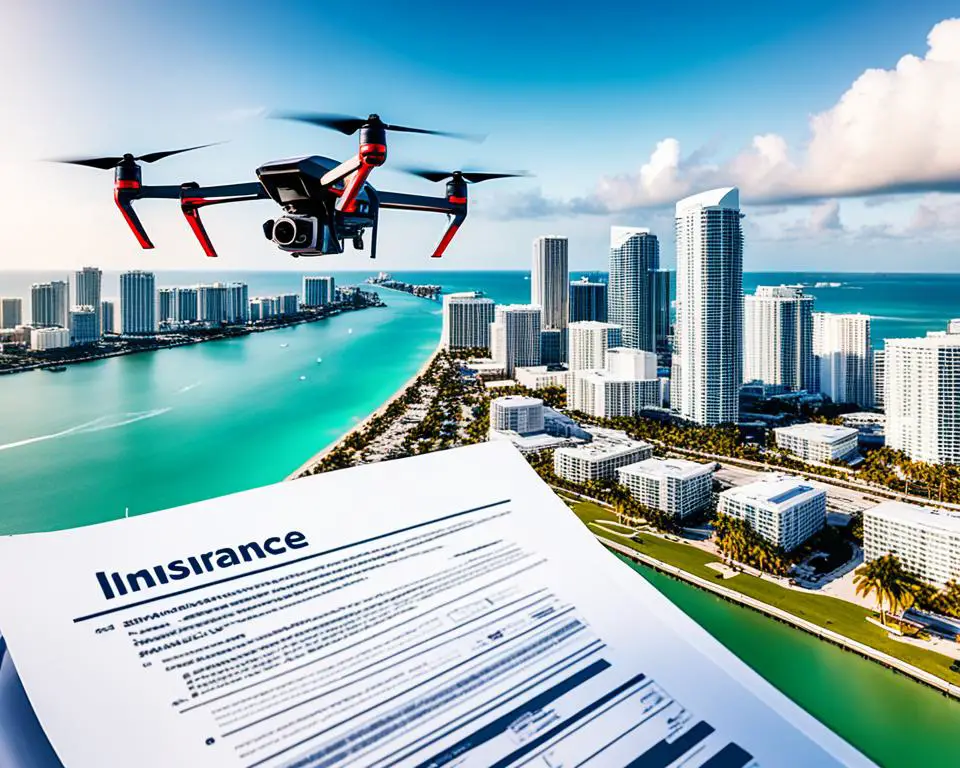
By understanding the insurance requirements for drone operators in Florida and obtaining the appropriate coverage, you can fly with confidence and minimize potential risks or liabilities. Whether you fly drones recreationally or operate them commercially, insurance is an essential safeguard that provides financial protection and peace of mind during your aerial adventures.
Conclusion
In conclusion, understanding and abiding by the drone laws in Florida is essential for safe and legal drone operations. By registering your drone with the Federal Aviation Administration (FAA), you can avoid any legal complications and ensure a smooth flying experience. Furthermore, it is crucial to follow airspace restrictions and designated no-fly zones to maintain the safety of both the drone and other aircraft in the sky.
Respecting privacy laws is also of utmost importance. Always obtain consent when capturing images or recordings of individuals and avoid any activities that may infringe upon their rights. By being a responsible drone operator, you promote a positive image of the drone community and help maintain a harmonious environment for all.
Remember to always adhere to the safety guidelines set by the FAA, such as flying below 400 feet, maintaining visual line of sight, and yielding right of way to other aircraft. Being aware of the penalties for violating drone laws in Florida is crucial, as it can result in fines, confiscation of the drone, and potential criminal charges.
Ultimately, by following the drone laws in Florida, you can enjoy the beauty of the skies while ensuring the safety of yourself, others, and the integrity of the drone industry as a whole.
FAQ
Do I Need to Register My Drone in Florida?
Where Can I Fly My Drone in Florida?
What Are the Safety Guidelines for Drone Operators in Florida?
What Are the Restrictions for Flying Drones Near Airports and Stadiums in Florida?
What Are the Privacy Laws for Drone Operators in Florida?
What Are the Penalties for Violating Drone Laws in Florida?
What Resources are Available for Drone Operators in Florida?
Are there Insurance Requirements for Drone Operators in Florida?
Source Links
- https://www.wokv.com/news/world/israeli-army-tells/LQ62IR4BLTGD5JJ3CB2LVK4YBM/
- https://economictimes.indiatimes.com/news/newsblogs/daily-news-and-latest-updates-iran-israel-hamas-war-us-president-biden-trump-sc-pm-hd-revanna-prajwal-revanna-delhi-live-6-may-2024/liveblog/109868385.cms
- https://www.fox10tv.com/2024/05/06/vietnam-veteran-reunited-with-dog-tag-he-lost-nearly-60-years-ago/

